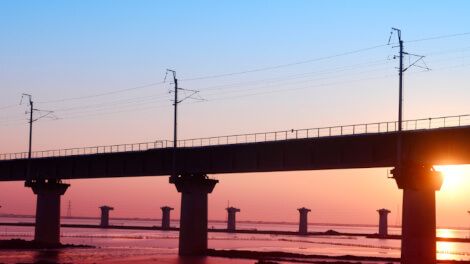Your partner for the safety of signalling and control-command systems
TÜV NORD Railway Technology is a qualified partner for manufacturers and operators of trains and railway infrastructure. We help you to make your train control, control-command and signalling systems safer and support you in areas such as PCT, LTC, ETCS and Security4Safety.
Control-Command & Signalling (CSS)




The term CCS - short for Control-Command and Signalling - covers various systems whose task is to transmit information between the track and the traction unit and to signal it to the driver. If certain signals are not properly heeded by the driver, serious accidents can occur. In this case, the systems intervene directly in the operational control and trigger an emergency braking.
Reliably functioning CCS systems are indispensable for safe rail traffic.
TÜV NORD competently supports you with qualified specialists for the safety of your CCS systems. In addition to component and system tests, our services also include product audits, safety audits, support during on-site test runs, and the testing of on-board and trackside installations.
Do you need European approval for your vehicle, national approval for a control-command system or an expert opinion for the national railway supervisory authority? Our competent experts are the right people to contact.
Point-based train control and line-based train control
The two most commonly used CCS systems are point-based train control (PTC) and line-based train control (LTC).
In the case of point-based train control systems, line and traction unit information is only exchanged at specific points, e.g. by means of magnetic fields or induction. This form of train control is cost-effective because most systems work according to the working current principle. However, system failures cannot be detected immediately, which limits the safety of point-based train control systems.
With line-based train control, the track and the traction unit are in continuous contact with each other by means of the closed-circuit current principle. Failures can therefore be detected immediately, which means that line-based train control systems, although energy-intensive, offer significantly increased safety. On high-speed lines, for example, line-based train control systems are indispensable.
European Train Control System (ETCS)
Most European countries have equipped their lines and vehicles with their own national CCS systems. The resulting variety of implemented CCS systems is to be replaced in future by the European Train Control System (ETCS), which is intended to make trans-European train traffic increasingly standardized and safer. Since 2002, EU law has stipulated the implementation of ETCS on new high-speed lines, and since 2006 this has also applied to upgraded lines.
With our Designated Body (DeBo) and our independent Assessment Body (AsBo), we at TÜV NORD support you in the implementation of country-specific requirements for control-command systems in Germany and, with our Notified Body (NoBo), check the implementation of the European regulations for the operation of an interoperably functioning ETCS.
Holistic security in the railway sector through Security4Safety
Modern trains are based on complex electronic systems that can be damaged by unauthorized access or targeted attacks if they are not protected. The resulting consequences can be devastating.
The correct protection of a system is also decisive for its security, reliability, availability and safety.
We check the protection of your system in accordance with the "Security4Safety" principle
- against unauthorized access or attacks with regard to unauthorized eavesdropping and unauthorized modification of information,
- with regard the authenticity of the sender information and
- in order to prevent externally induced system failures.
Together with our subsidiary TÜViT, we at TÜV NORD are at your side with our expertise in the area of security of electronic systems, helping you with tasks relating to the implementation of standards and guidelines and thus making your products more secure.
PTC, LTC, ETCS, TSI CCS - Our services at a glance
Signalling infrastructure
- Examination of migration concepts
- Assessment of hazard and risk analyses, safety proofs
- Assessment of safety and functional verifications for generic products, generic applications as well as for specific applications (EN 5012x, EN 50159)
- Expert opinion for New Type Approval procedures
- Product and system certification
- EC conformity tests
On-board command-control systems
- Assessment of hazard and risk analyses, safety verifications
- Assessment of safety and functional verifications for generic products, generic applications as well as for specific applications (EN 5012x, EN 50159)
- Product and system certification
- EC conformity tests
Training
- Hardware development according to DIN EN 50129
- Software development according to DIN EN 50128
- Verification according to EN 5012x
- Security in the railway sector EN 50159 and DIN EN / IEC 62443
- Basic ETCS training
- Advanced training courses on:
- Integration of ETCS in the vehicle
- Implementation / parameterisation of ETCS routes
- Maintenance of ETCS vehicle components
- Testing of ETCS track components
Your advantages in working with TÜV NORD in the field of signalling technology
Our competence
- Independence and neutrality
- Specialized experts with many years of experience
- Experts with Federal Railway Authority recognition
- Accredited inspection body according to DIN EN ISO/IEC 17020 (DAkkS)
- Notified Body (NoBo)
- Designated Body (DeBo) in Luxembourg
- Interim DeBo in Germany
- Independent Assessment Body (AsBo)
- Partner of the federal state and local authorities (Federal State Railway Supervisory Authority (LfB, TAB))
- Associated partner of the German Notified Body
Your benefit
- Protection of people and the environment
- Cross-system expertise from a single provider
- Comprehensive support from our experts
- Independent and needs-based advice
- Expert opinions recognized by the authorities
- In-depth knowledge of homologation processes


